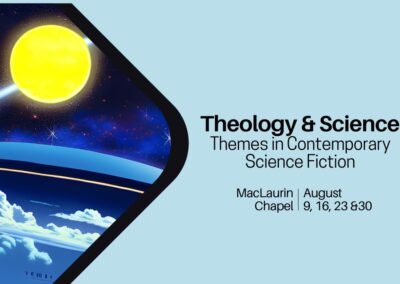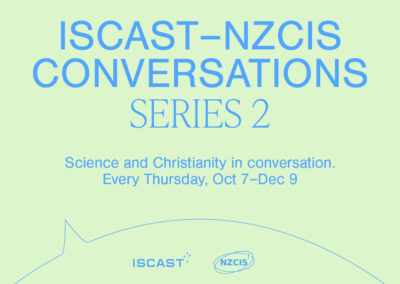By Gray Manicom, Phd student in mathematics, University of Auckland

Galileo Galilei supposedly said “Mathematics is the language in which God has written the universe”. This makes Mathematics seem like something independent of God, that exists without God and that existed before creation. What I would like to consider in this blog is the seemingly necessary nature of Mathematics and compare it to the necessary nature of God. In a world that relies increasingly on mathematical explanations, from theoretical physics to the laws governing computers to understanding why bees make their hives using hexagons, Christians need to be able to fit Mathematics into their theological frameworks and worldviews.
In Christian tradition the aseity of God is unique- God and only God exists from within and by God’s own nature. However, most people probably struggle to imagine a universe in which mathematical laws are not true, and where mathematical entities don’t exist. By mathematical entities I mean things like numbers and sets. By mathematical laws I mean the primary relationships between those entities, such as addition and multiplication. Both of these categories can be greatly extended by either defining them or by proving that new relationships or entities (with certain properties) exist. They seem to have no cause and, perhaps, are uncreated. When people do consider them created, they usually think them created by humans, but then face incredible challenges in showing why it is so trustworthy and so vast. If we create maths to solve problem x, why then should we trust the solutions that same Mathematics gives to problems y and z? In particular, for many people Mathematics seems to exist a se, that is, from itself. Yet, in Christianity, this property is solely attributable to God. John 1, speaking of the Logos/Christ as God, says “Through him all things were made; without him nothing was made that has been made.” The doctrine of aseity says that, in some sense, God even made God, since existence itself is within God’s nature. So a certain challenge to God’s unique aseity comes from mathematical realists, particularly those that William Lane Craig calls “Heavyweight Platonists”, who insist that mathematical objects exist as real, immaterial objects by necessity.
It is important here to draw a distinction between the natural laws and the mathematical laws, as well as between mathematical objects and physical objects (without getting bogged down too much in the detail I include things like waves and forces as physical objects). The first difference I want to emphasize is that our imaginations handle physical laws differently to mathematical ones. Two physicists from two universes might have very different understandings of the laws of nature, but they would certainly agree that one physicist plus another physicist is two physicists. We could imagine that gravity was created, because we can imagine gravity being something other than what it is; we can imagine that the gravity on Earth was that of Jupiter, and Jupiter’s that of the moon’s, or we could imagine it reversing every other minute so that for one minute we all go flying off the ground and for the next we all come crashing back down. This makes it easier to understand or accept the idea that there once was no gravity, and then there was. However, if the gravitational force on Jupiter was twice that of Earth’s, it is seemingly impossible to imagine that doubling a number would give anything else except twice that number. GK Chesterton calls this the test of Fairyland: there are laws of physics and chemistry, the “weird repetitions”, which can be broken in fairy tales because we could simply imagine them differently, and there are mathematical laws, which remain true in every fairy tale ever written. This extends to more complicated mathematical statements as well. Although one might imagine that the statement “All natural numbers have a unique prime factorization” is not true, the heavy burden of deductive proof demands that it must be true. Either we must be able to imagine that the basic statements and rules of Mathematics could be different, or else we must accept the results that those basic rules produce when applied to those basic statements. Mark Colyvan writes “[Mathematical] explanations typically tell us that not only is the world thus and so, but, in a very important sense, it had to be thus and so”. The natural laws seem to obey the mathematical ones and the mathematical ones seem somehow necessary.
Indeed, this forms the basis of the strongest cases made for mathematical realism (known as the indispensability argument), which states that if we want to ontologically commit ourselves to the entities that are indispensable to our best scientific theories, and that Mathematics is indispensable to our best scientific theories, then we should at least be as ontologically committed to mathematical entities as we are to scientific entities. As an example, if we believe in atoms and their quantum structure because that is the best explanation for the observed data we have, then we should also believe in the numbers and mathematical relationships that we use to describe how atoms behave. If both are indispensable to our best theories then both should be believed to exist. While this could classify intangible mathematical objects in the same ontological category as intangible physical ones, the heavyweight platonists now emphasize that the incredible power of mathematical entities to explain so many disparate scientific theories justifies a stronger ontological commitment to them than to the non-mathematical entities. While we believe in quarks because of their ability to make sense of quantum theory, we need not care about quarks elsewhere, and thus our ontological commitment to the existence of quarks is somewhat limited to the range of their explanatory power. However, we use Mathematics to explain quarks, biology, chemistry, accounting, tax returns, theft, building etc. There seems to be an unlimited range of knowledge which is reliant on Mathematics. Therefore, our ontological commitment to mathematical entities should be unlimited.
Both the mathematical laws and the mathematical entities seem to be more fundamental, and more likely to exist a se, than their non-mathematical counterparts. Indeed, what would cause them to exist? Talk of cause and effect is totally out of place in Mathematics; we do not say one and one causes two, we say that one and one is two. The first premise of the Kalam Cosmological Argument for the existence of God is “whatever begins to exist has a cause.” If this is true then its contrapositive must be true: that whatever has no cause did not begin to exist. Since mathematical entities clearly exist in some sense, and seem to have no cause, then they must have always existed. By this view Mathematics is before all things, and in Mathematics all things hold together. In summary, we seem to be ontologically committed to believe in mathematical entities, the test of Fairyland seems to commit us to believe in mathematical laws, and we have no real explanation for what would cause these things to exist, since mathematical objects are not causal themselves.
This presents a challenge to the Christian theist. Not only does it challenge the unique aseity of God, but might challenge common conceptions of miracles. Most philosophical and theological discussions of the miracles follow something like CS Lewis’ definition that miracles are “an interference with Nature by supernatural power”. However, highlighting the difference between laws of nature and laws of Mathematics may challenge this. It is perhaps easier to believe in the resurrection than the feeding of the 5000, because we can picture the resurrection in our heads, but we cannot imagine two fish suddenly being five thousand, without invoking some unusual interference with some fishy, non-mathematical law. In fact, I have seen many movies depict the resurrection, awash with holy light. The best I have ever gotten for the feeding of the 5000 is a scene cut and suddenly there is a lot of food. Even the animated videos cannot achieve this. This is not to say that the miracle could not have happened, for there is still mystery, but it is to say that our interpretations and explanations should not ignore the differences between the types of laws that seem to be being interfered with.
Returning to God’s aseity, how do we, as theists, approach this? Most obviously, one can be an anti-realist and deny that mathematical entities exist in any real sense. By this account, Mathematics is a set of useful tools people have invented in order to solve problems. It is human creativity that causes the mathematical entities to exist, and it is the utility of the relationships between these entities that allows the laws to exist. This must be true to some degree, since mathematicians very obviously invent things, but it is a very weak form of existence for something so substantial. The challenge to this idea is not that the tools aren’t useful, it is that they are so useful that they can be used in every domain of knowledge for thousands of years, providing surprising insights with incredible accuracy and harnessing astounding predictive power without failing and can then be applied to a completely different set of problems and not skip a beat. The profundity and scope of mathematical revelation makes it difficult to see how we could have invented it. As Albert Einstein pondered, “How is it possible that Mathematics, a product of human thought that is independent of experience, fits so excellently the objects of physical reality?” That did not make Einstein a realist, but he acknowledged that there is a deep mystery there. Certain thinkers such as Mario Livio claim that Mathematics is both invented and discovered; the entities and some basic theorems are invented but the underlying relations between them are discovered. However, if the underlying relations were there to begin with, the challenge of fitting these mathematical laws into a Creation narrative still remains.
There is perhaps another solution, one which does not deny that mathematical entities exist. Perhaps we can embrace realism without challenging God’s aseity. Supposing that mathematical laws and entities exist, then we can formulate a mathematical form of Euthrypro’s dilemma which asks “Is something good because God wills it or does God will it because it is good?”. If you say that something is good because God wills it then goodness is arbitrary and can change with God’s will. One day murder can be evil and the next it can be good. However, if God wills it because it is good, then moral values are not based on God, and are indeed higher than Him. Similarly we can ask “Is something mathematical because God wills it, or does God will it because it is mathematical?” If the laws of Mathematics follow God’s will, then they are arbitrary and we cannot trust them. If God wills that things follow the blueprint of Mathematics, then Mathematics must exist independently of God.
The standard response to this dilemma is that God is Goodness itself, therefore the separation in the dilemma is a false separation. God wills the good because God is good. I suggest that this same logic can be applied to the mathematical form. God is mathematical. After all, if rationality is in God’s nature, and Mathematics is arguably the most rational body of knowledge of all, could it be that the existence of mathematical entities and laws are somehow bound up in the existence of the creator? Logos was the word used by the ancient Greeks to describe how a vast and dynamic world could still be predictable and orderly. It was closely linked to their (often religious) mathematical beliefs; to the ancient Greek Mathematics was the natural realisation of the platonic ideal. John Chapter 1 puts Logos at the centre of the creation story, before revealing that it is Christ- God incarnate. By implication, the mathematical coherency of the universe is not merely a product of creation, but is part of the process of creation, and indeed, part of the Creator. With this in mind, God’s aseity goes unchallenged by “Heavyweight” mathematical realism, but can become something that celebrates it. Jesus declares “I am the truth”. I am suggesting that we may extend what he meant by that to include mathematical truth. As Professor of Mathematics John Lennox says, “The only thing that makes reasonable the effectiveness of mathematics is my faith in God”.
The purpose of this blog was not to present the substance of the philosophical arguments for and against mathematical realism, but rather to show that these arguments have their own relationship to our theological understanding. In turn, our theological insights can give meaning to the mathematical madness, for without the divine mind the effectiveness of Mathematics seems unreasonable indeed. In particular, mathematical laws, entities and methods are not the laws, entities and methods of the physical sciences, which are the focus of natural theologians. Finally, by bringing some of these age-old conundrums to the fore, perhaps some high-school suppositions about what Mathematics is (especially if “boring” is an adjective of choice) have been challenged. Our view of Mathematics impacts all of our lives, like it or not. Indeed, it is society’s view of Mathematics that has made it the benchmark of thought and education- the standard-bearer of how smart a child is. Some people see Mathematics as a universal language, robust and free from cultural influences, while others want to decolonize it. Some people see Mathematics as infallible, while others say only the Bible is infallible, while yet others say nothing is infallible. Honest engagement with these issues requires Christians to be able to fit Mathematics into their worldviews in some way.
References:
Craig, William Lane. “God and abstract objects.” Philosophia Christi 17.2 (2015): 269-276.
Colyvan, Mark. “The ins and outs of mathematical explanation.” The Mathematical Intelligencer 40.4 (2018): 26-29.
Chesterton, Gilbert Keith. Orthodoxy. Vol. 12. Image, 2012.
Wigner, Eugene P. “The unreasonable effectiveness of Mathematics in the natural sciences.” Mathematics and Science. 1990. 291-306.



